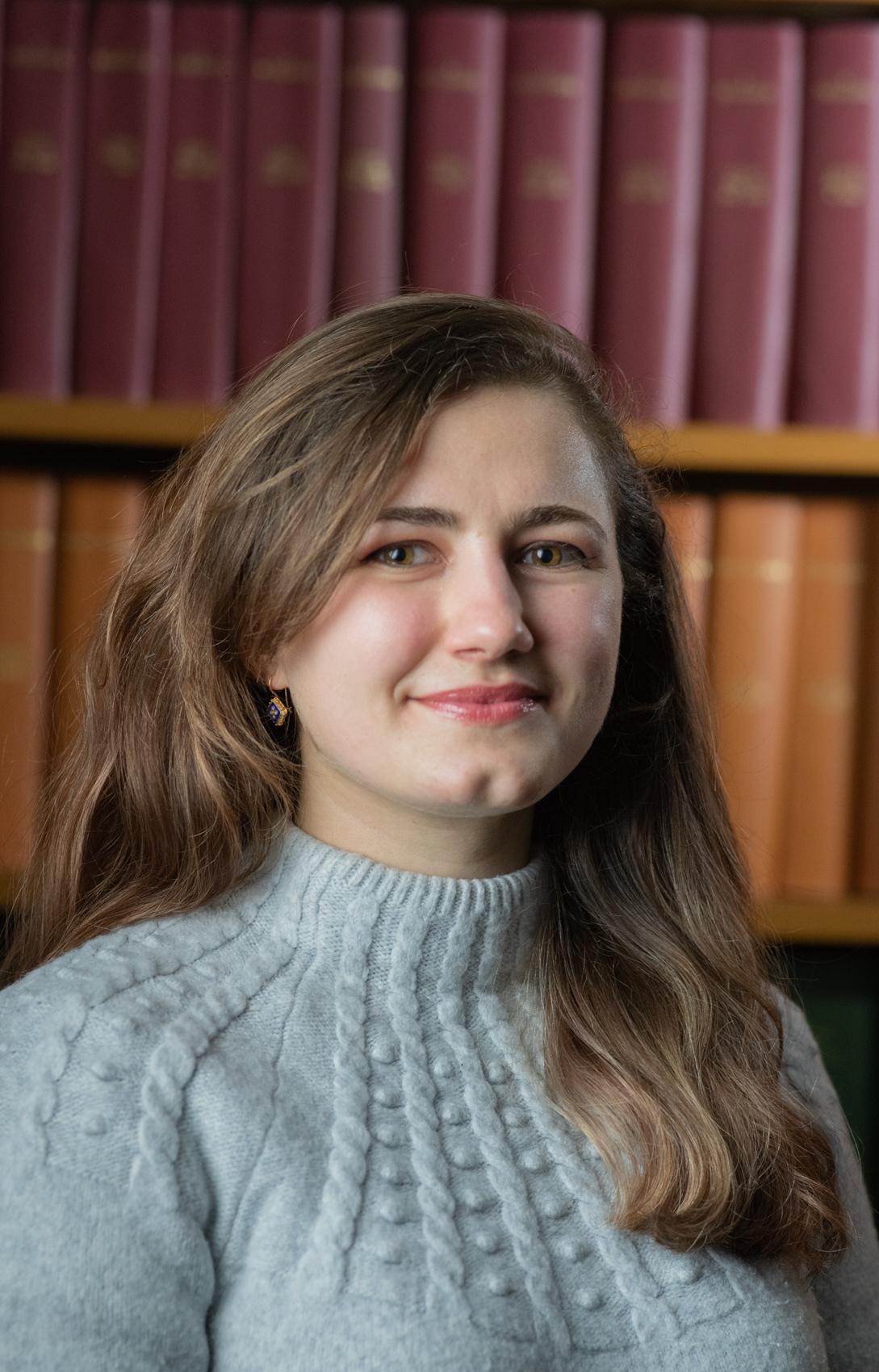
Our congratulations to Unit postdoctoral researcher Dr Ioana Grigoras on receiving one of the 2025 Early Career Excellent Teacher Awards from the Medical Sciences Division!
These awards acknowledge people who have demonstrated excellent teaching and who are within the first five years of their teaching career at the University of Oxford. Ioana is being recognised for her work as a Stipendiary Lecturer in Medicine (Pharmacology) at St Hilda's College, as well as for supervising multiple MSc and undergraduate students on research projects.
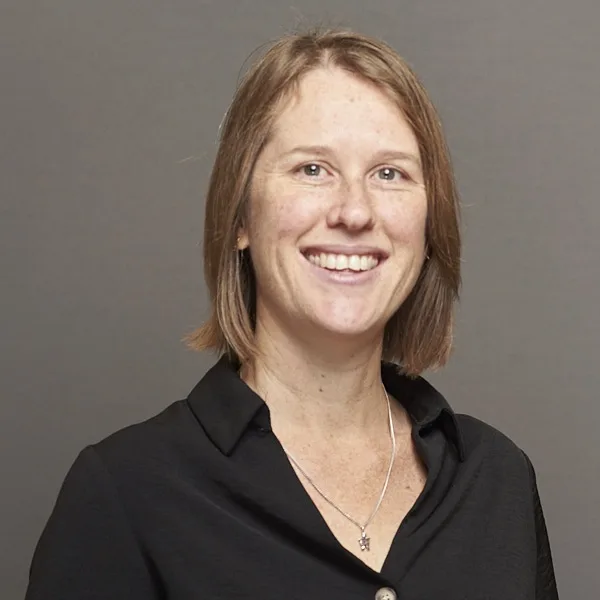
Many congratulations to Unit collaborator Associate Professor Melanie Fleming on being awarded a prestigious Senior Non-Clinical Lectureship by the Stroke Association.
The Stroke Association Lectureship programme aims to address succession and sustainability in the careers of stroke researchers. Senior Lectureship awards provide secure and stable long-term funding for researchers to lead their own research programmes and establish their independent careers.
Melanie will start her 5-year Senior Lectureship and join the Unit as a new Group Leader in January 2026.
Melanie commented: “I am very grateful for this opportunity to build my research group, and to be able to work together with people with lived experience of stroke to develop a tailored sleep intervention for this condition.”
Unit Director Professor Peter Magill commented: “We are thrilled for Melanie. This award is richly deserved. Melanie is an outstanding researcher, and a valued colleague and collaborator. Melanie has made pivotal leadership contributions to the Unit’s patient and public involvement activities, and we look forward to supporting Melanie to realise her research ambitions.”
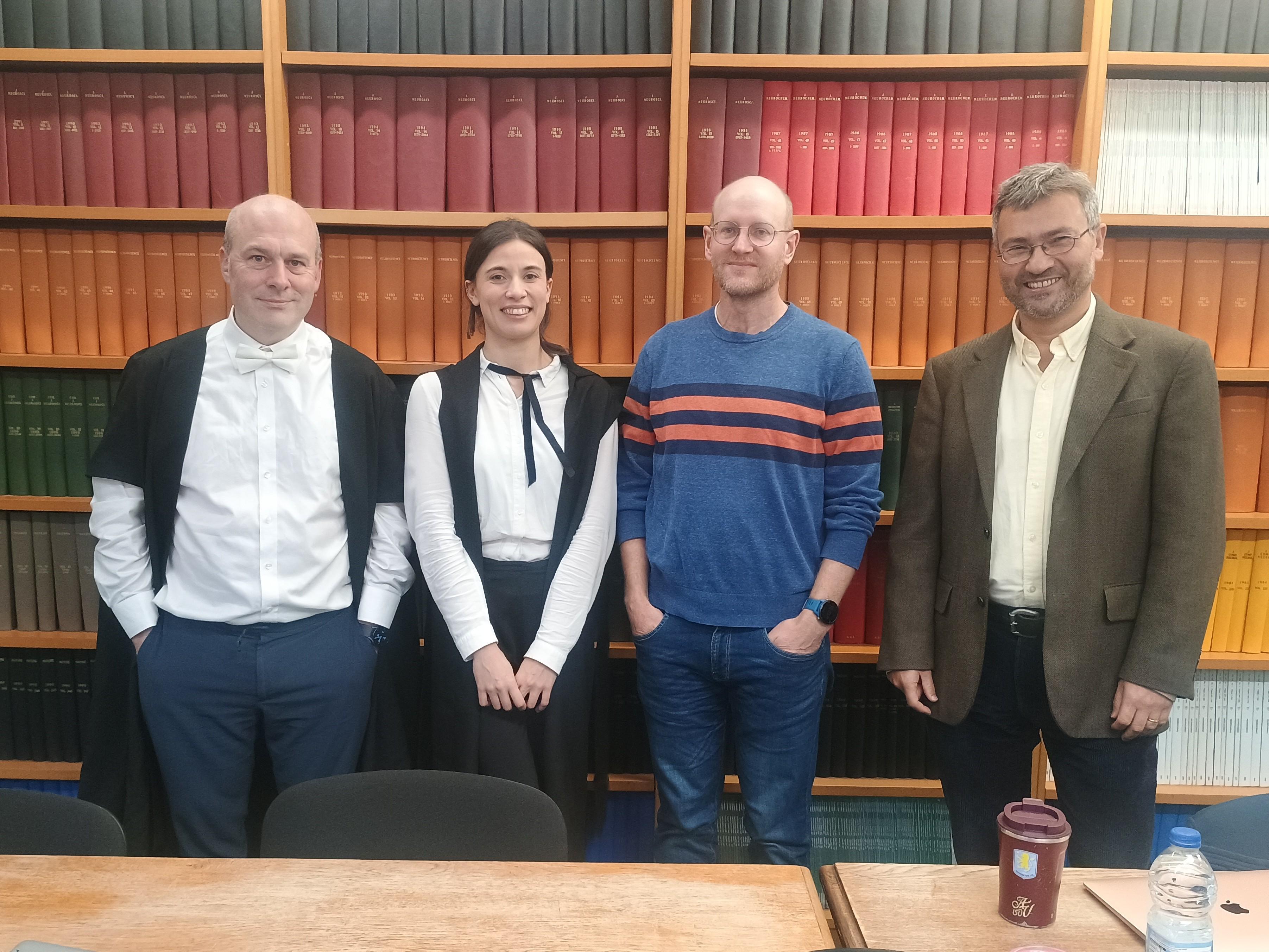
Our congratulations go to Unit D.Phil. student Charlotte Collingwood for successfully defending her doctoral thesis, entitled “A Computational Model of Habits in the Brain”, in her viva voce examination on 11 November 2025.
Charlotte’s viva examiners were Professor Elliot Ludvig (University of Warwick) and Professor Michael Browning (University of Oxford).
Charlotte was supervised in the Unit by Professor Rafal Bogacz.

We are delighted to announce that the work of the Medical Research Council Centre of Research Excellence (MRC CoRE) in Restorative Neural Dynamics starts today, 1st November 2025.
The MRC CoRE in Restorative Neural Dynamics is a unique research and innovation collaboration between stakeholders in academia, industry, healthcare services, research charities, and the public.
Over the next 14 years, the MRC CoRE will pioneer new ways of working to unlock the immense potential of harnessing neural dynamics with next-generation neurotechnology to alter the trajectories of brain conditions and improve the quality of life of people affected by them.
You can stay up to date on MRC CoRE news and progress by following its social media channels:
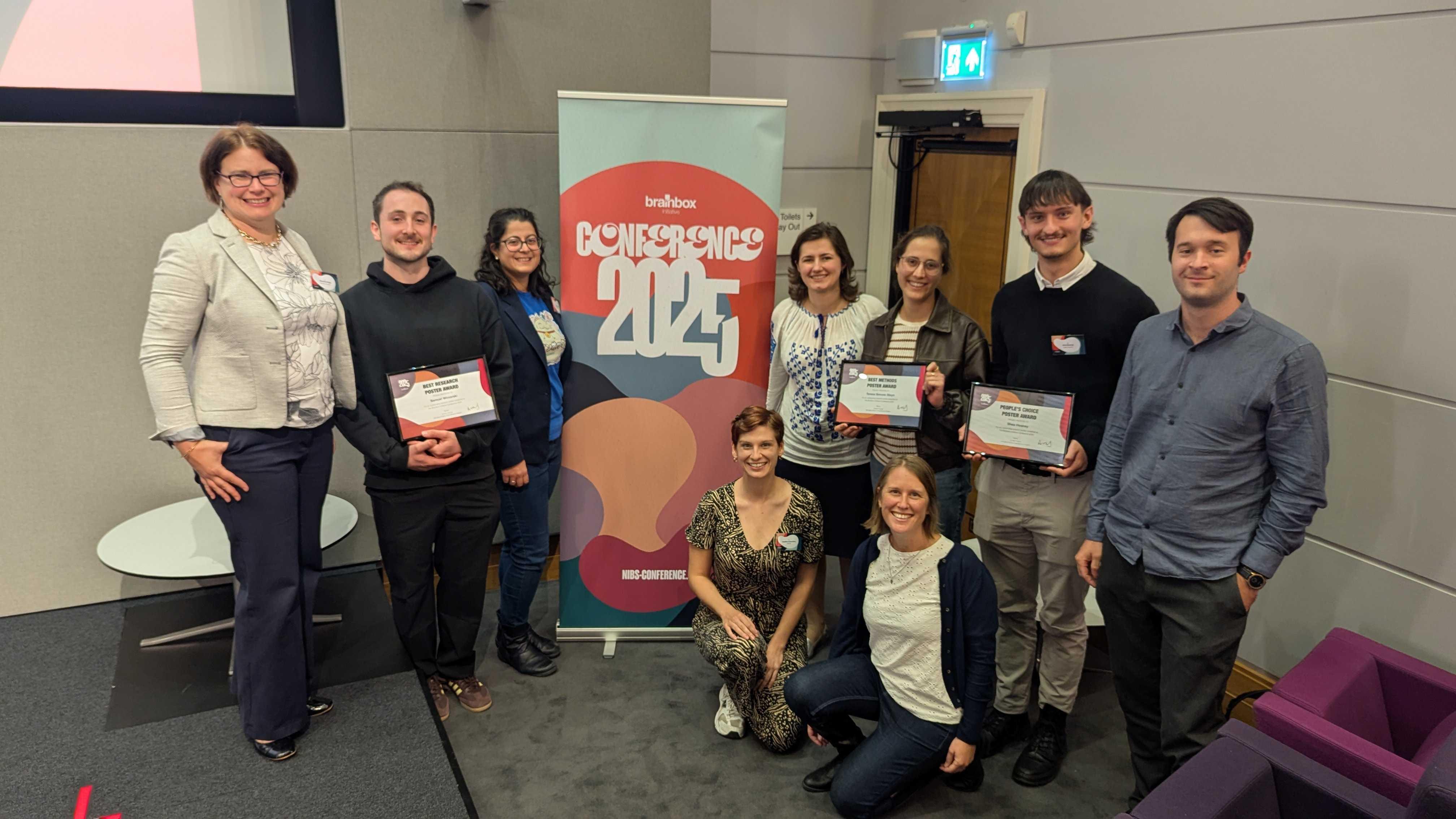
We congratulate both Unit students, Shea Heaney and Teresa Simoes Steyn, for winning poster prizes at the Brainbox Initiative Conference on the 26th of September!
Teresa, a DPhil student supervised by Dr. Joram van Rheede at the Unit and Dr. Melanie Fleming, won the Best Methods Poster Award for her poster entitled "Closed-Loop Brain Stimulation Targeting Slow Waves for Memory Consolidation During Sleep".
Shea, an MBiomedsci in Neuroscience student supervised by Dr. Polytimi Frangou and Prof. Charlotte Stagg at the Unit, won the People's Choice Poster Award for his poster entitled "Effects of Donepezil on attentional processing and TMS measures of GABAergic and Cholinergic signalling".
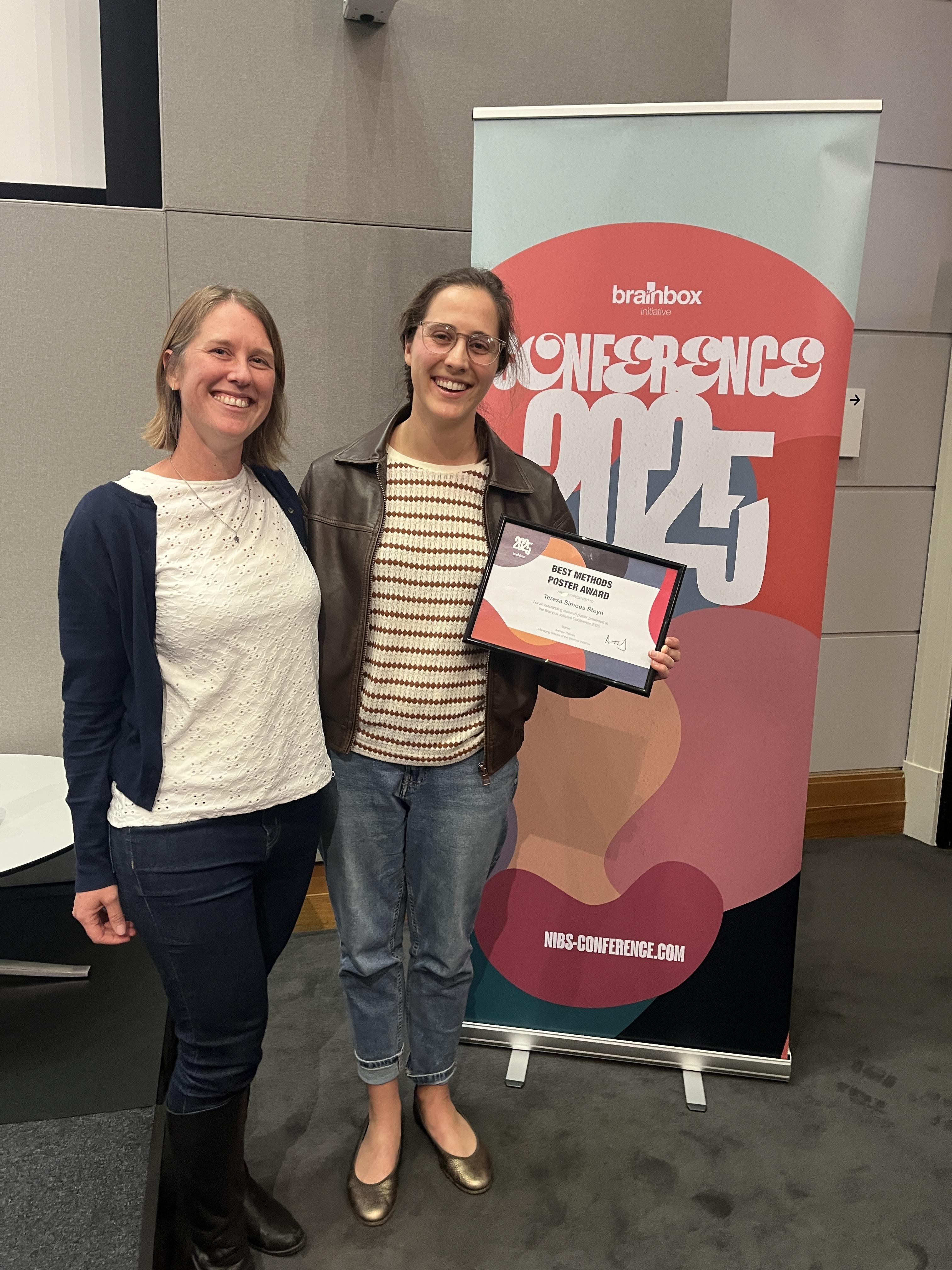
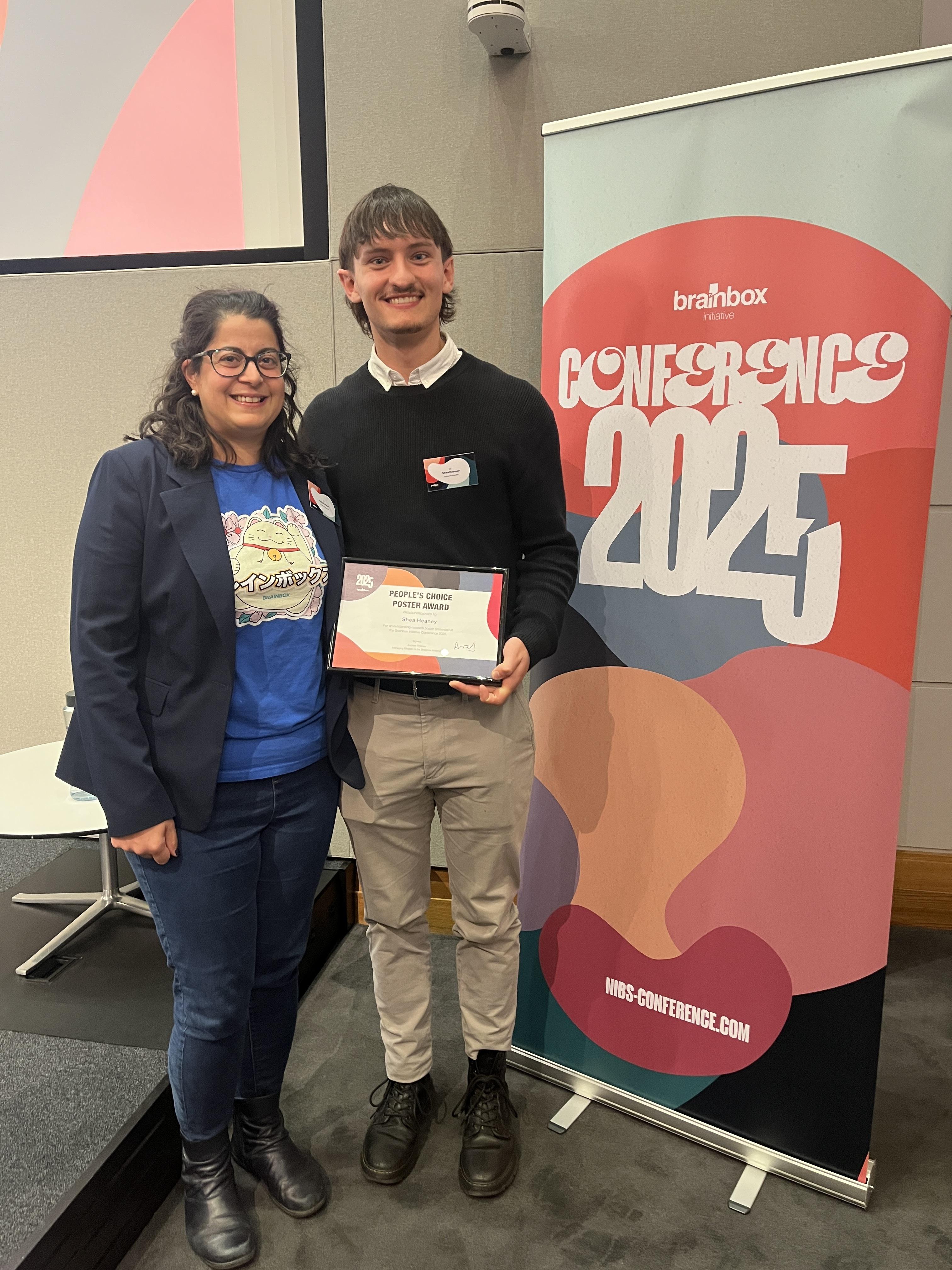
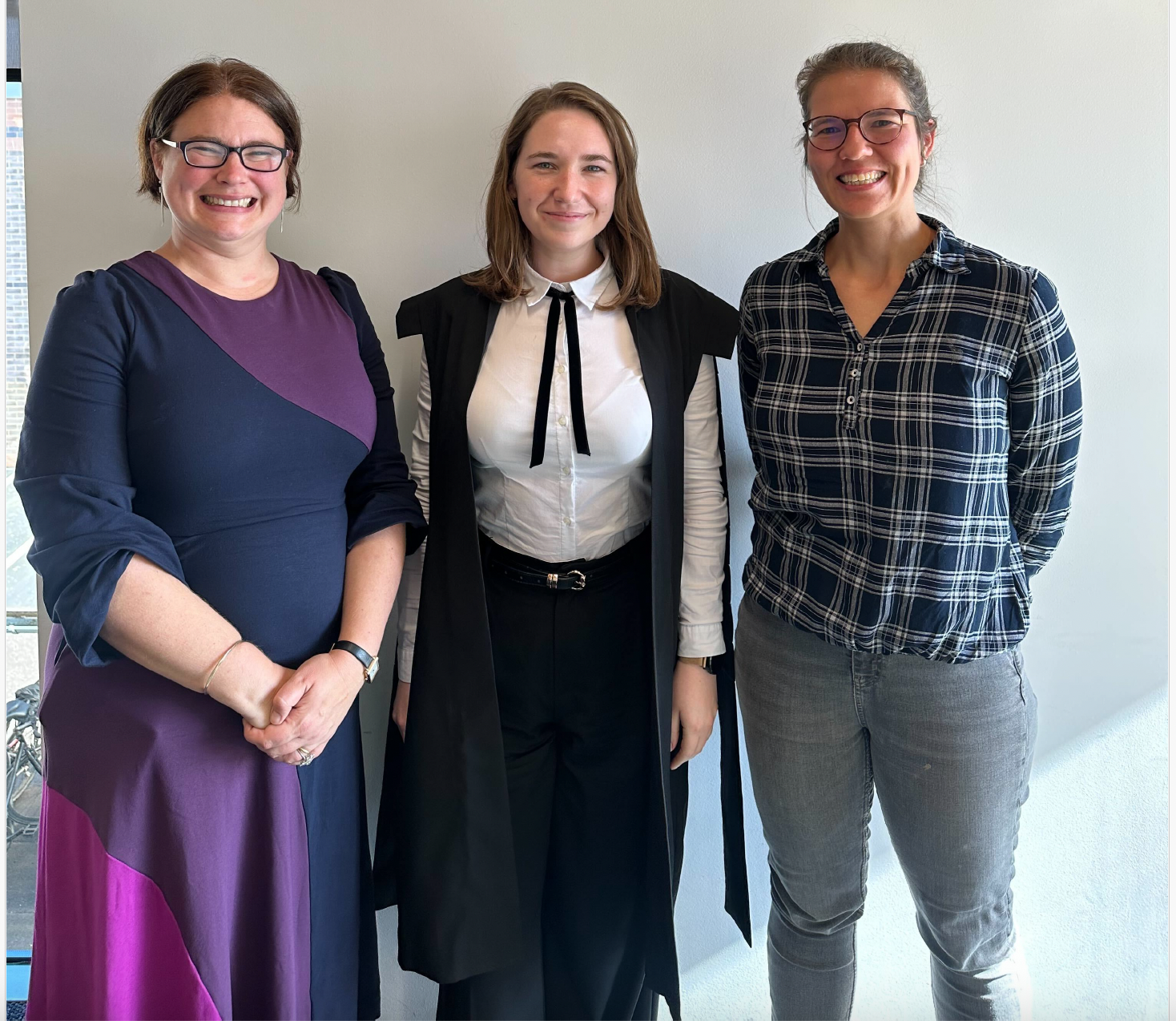
Our congratulations go to Unit D.Phil. student Patricia Cambalova for successfully defending her doctoral thesis, entitled "Investigating the function of inhibition in the human primary motor cortex using multimodal approaches", in her viva voce examination on 11th September 2025.
Patricia’s viva examiners were Professor Stephen Hall (University of Plymouth) and Professor Heidi Johansen-Berg (University of Oxford).
Patricia was supervised by Professor Charlotte Stagg and Dr. Catharina Zich, both at the Unit, and by Prof. Martin Turner from the Nuffield Department of Clinical Neurosciences.

We are delighted to announce that for a third consecutive year the Unit has achieved multiple accreditations through the Laboratory Efficiency Assessment Framework (LEAF), a nationally recognised scheme designed to improve the sustainability and efficiency of laboratories.
Seven laboratories at the Unit improved their sustainability practices and achieved a higher level of accreditation. The Barron Group, Tan Group and Oswal Group each gained Silver Awards for the first time. The Denison Group, Dupret Group, Magill Group and Sharott Group each gained Gold Awards for the first time.
To gain the Awards, each Group was audited for the practical steps they had taken to meet several assessment criteria, including those related to the use of equipment and space, the management of samples and chemicals, ventilation, waste/recycling, and the engagement of colleagues.
Dr Camille Loiseau, Chair of the Unit’s Sustainable Science Working Group, commented “It’s fantastic to see our continued commitment to sustainability recognised through multiple Silver and Gold LEAF Awards this year. Each Group went above and beyond to adopt more sustainable ways of working, and these outcomes reflect the dedication and collaboration of our Unit members. LEAF continues to be a powerful tool for driving change, and I’m proud of how the Unit is leading by example in making research more environmentally responsible”.

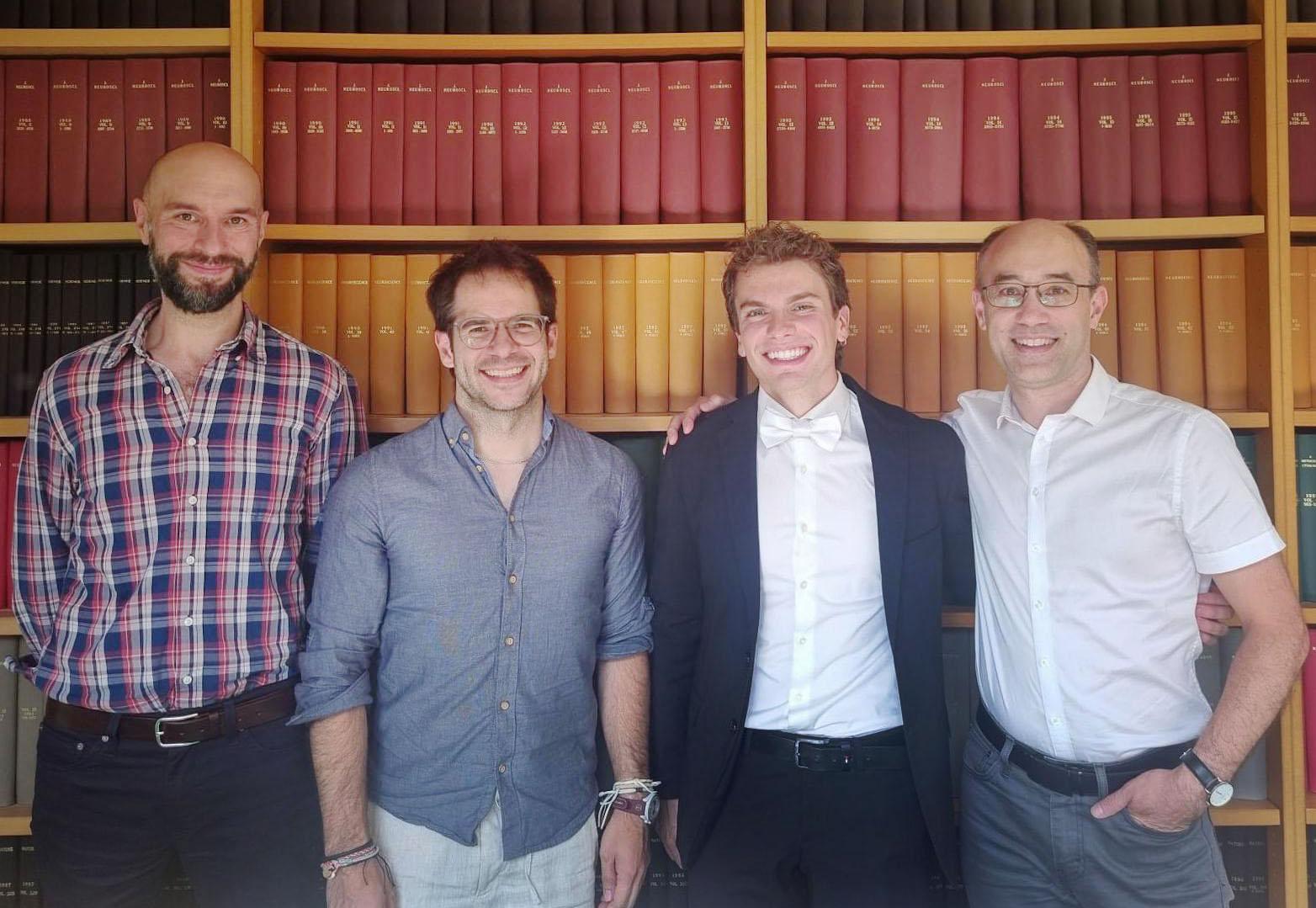
After the viva voce: A happy D.Phil. candidate (centre right) with satisfied examiners (left) and proud supervisor (right).
Our congratulations go to Unit D.Phil. student Manfredi Castelli for successfully defending his doctoral thesis, entitled “Accessing the diversity of hippocampal ripples”, in his viva voce examination on 18th July 2025.
Manfredi’s viva examiners were Dr Manuel Valero (Hospital del Mar Research Institute, Barcelona) and Professor Bernhard Staresina (University of Oxford).
Manfredi was supervised Professor David Dupret at the Unit and by Professor Renaud Lambiotte (Mathematical Institute, Oxford).
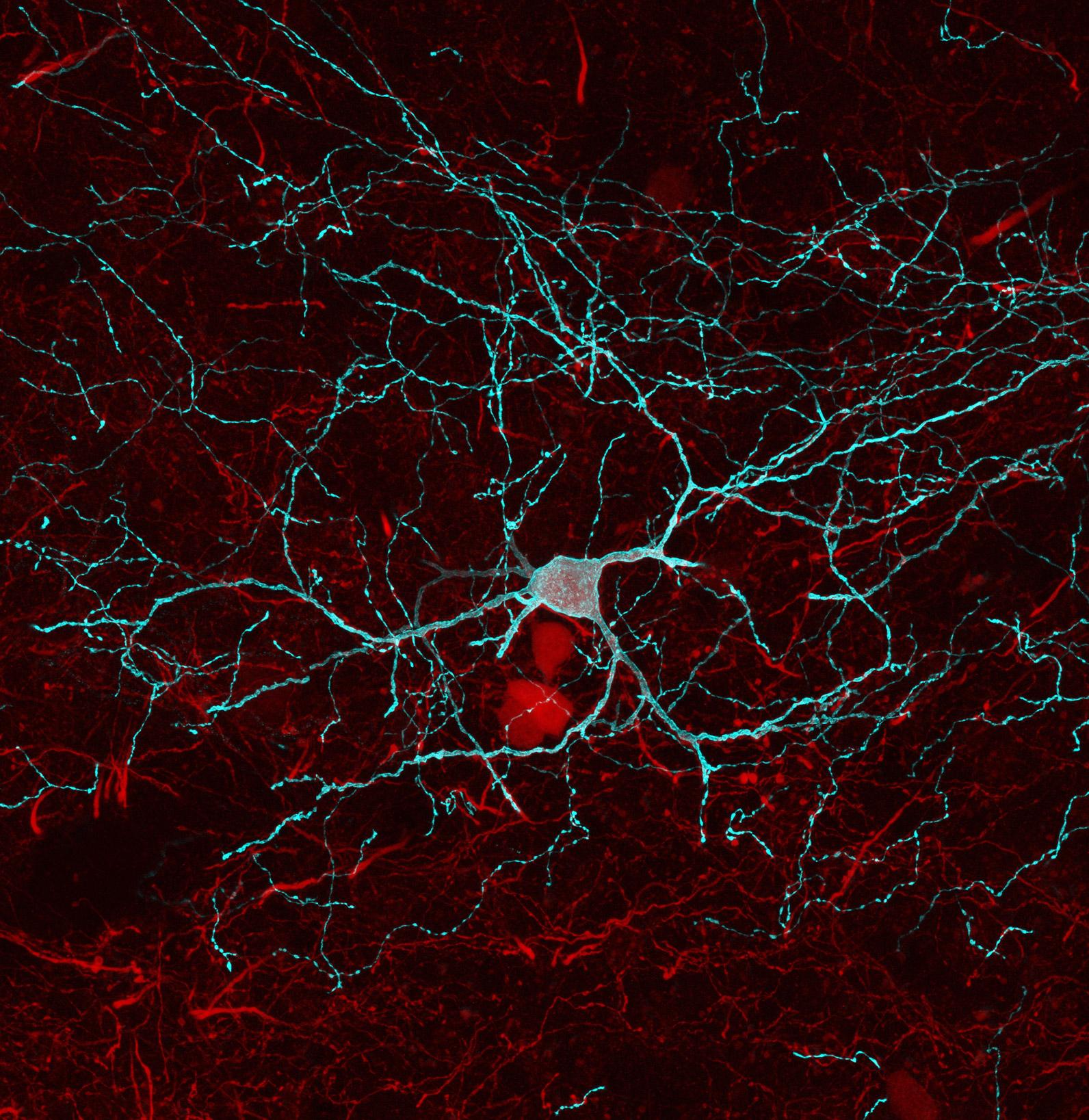
UK Research and Innovation today announced the launch of a new Medical Research Council Centre of Research Excellence (MRC CoRE) that aims to develop device-based treatments for brain conditions including Parkinson’s, dementia, stroke and childhood epilepsy.
The MRC CoRE in Restorative Neural Dynamics will receive up to £50 million in funding over 14 years.
The new flagship endeavour will start later this year and will be led by researchers at the University of Oxford, Cardiff University, Great Ormond Street Hospital for Children, Imperial College London, and Newcastle University.
The MRC CoRE team will investigate 'neural dynamics’, the complex and changing patterns of activity across networks of nerve cells in the brain that underlie behaviour. They will study how neural dynamics arise in health and are disturbed in brain disorders. The team will exploit knowledge of neural dynamics as they develop novel interventions and neurotechnology – ranging from brain implants to non-invasive and wearable devices – that could improve how the brain and body functions.
In tackling their collective challenge, the team also aim to set new benchmarks in research culture, stakeholder involvement, and collaborative working between public and private sectors.
Unit Director Professor Peter Magill, who is also founding Director of the MRC CoRE in Restorative Neural Dynamics, commented: “We are thrilled to have the opportunity to build on the many successes of the Unit and to evolve our discovery and translational research, together with that of our partners, in a new challenge-led direction. Many thanks to colleagues at the Unit, the Nuffield Department of Clinical Neurosciences, and our partner organisations for their contributions to this exciting new vision for harnessing neural dynamics to transform medical device-based therapies for brain conditions.”
UKRI’s announcement of the MRC CoRE in Restorative Neural Dynamics.
University of Oxford’s announcement of the MRC CoRE in Restorative Neural Dynamics.
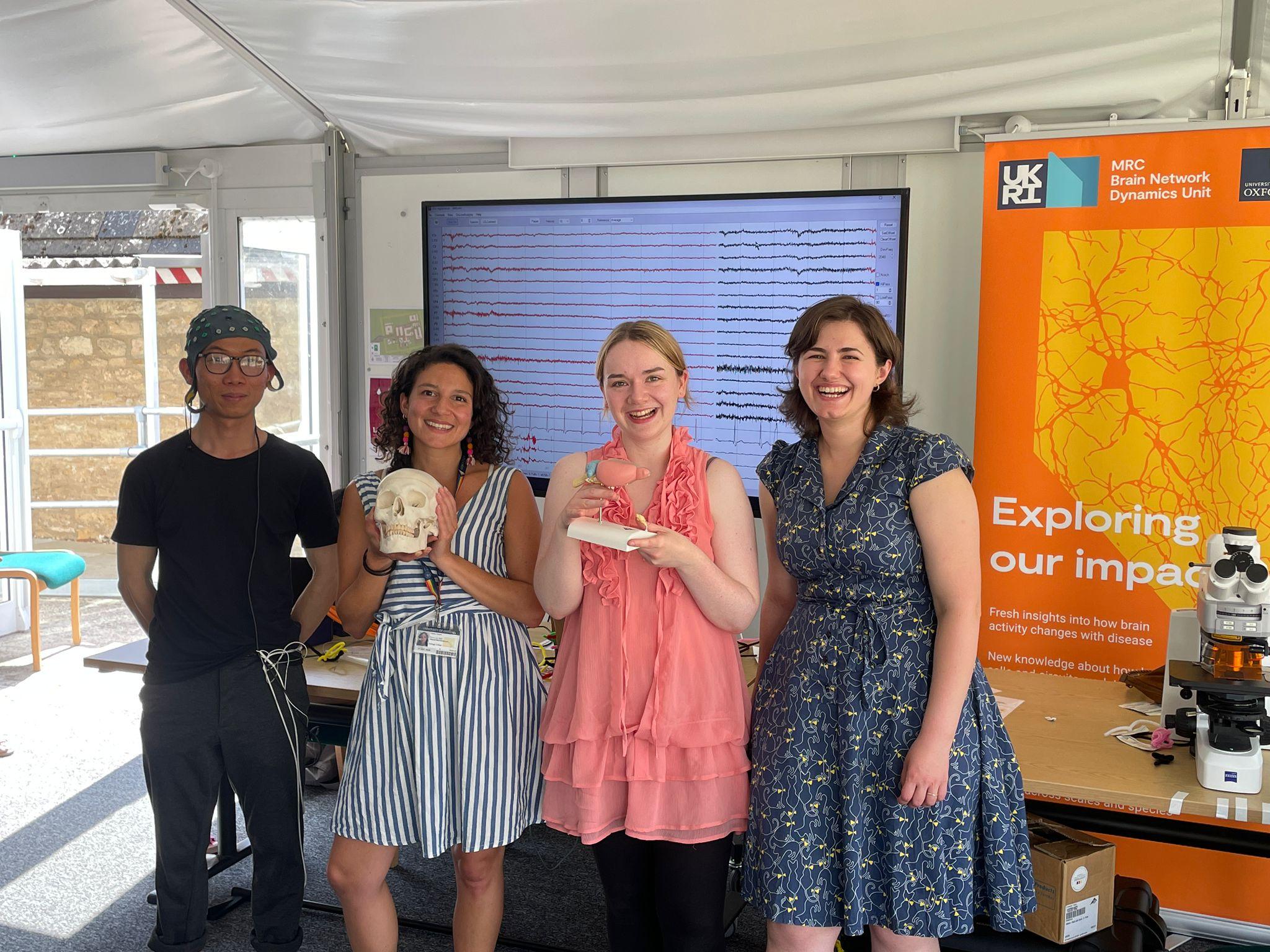
The enthusiastic BNDU team of scientists. (L-R) Shenghong, Chiara, Rosie and Ioana.
The Unit was delighted to host a stand at the University of Oxford’s Science Wonder Garden Party on 21st June 2025 at Begbroke Science Park. The event was a huge success, drawing over 2,000 attendees of all ages, all eager to learn more about science.
Visitors discovered the full scope of research at the Unit, from microscopic investigations of individual neurons to large-scale techniques used in humans, and how these approaches help us understand and potentially treat brain disorders. Shenghong He captivated guests with a live demonstration of his brain-computer interface, projecting his own EEG signals in real time. Ioana Grigoras and Iris Weichert amazed the crowd by eliciting visible muscle twitches using Transcranial Magnetic Stimulation to stimulate the motor cortex and forearm muscles.
Meanwhile, Rosie McDonald-Hill and Chiara Toschi gave guests a glimpse into brain anatomy through fluorescent neuron displays under the microscope. They also guided visitors in building brain models and exploring how the human brain compares to that of rodents. Younger future scientists enjoyed crafting their own pipe-cleaner neurons to take home as a fun souvenir.
A huge thank you to everyone who made the day such a success, especially organiser Natalie Doig, and to all our enthusiastic visitors!
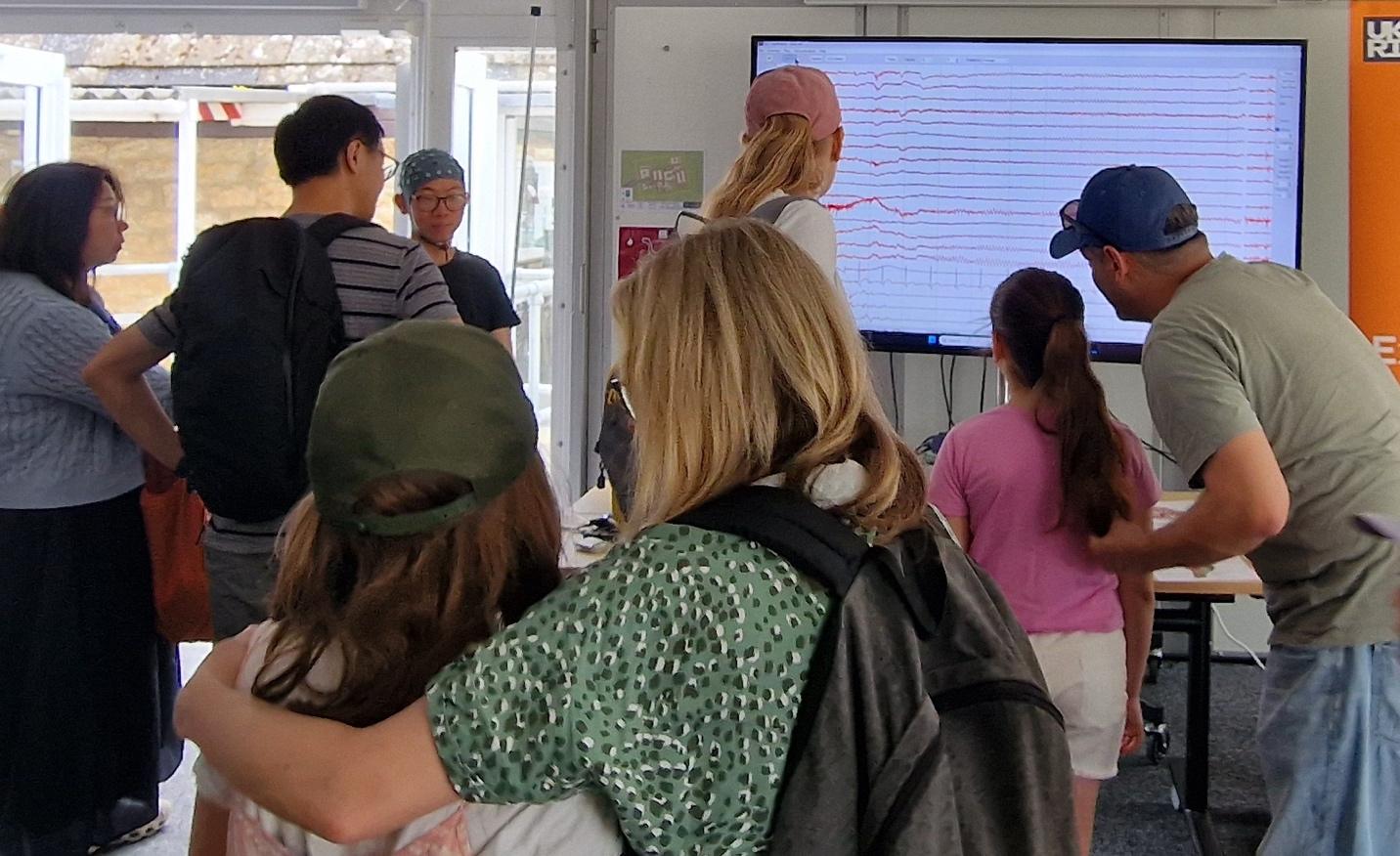
BNDU researcher Shenghong He (left) explains Electroencephalogram recordings to a captivated audience
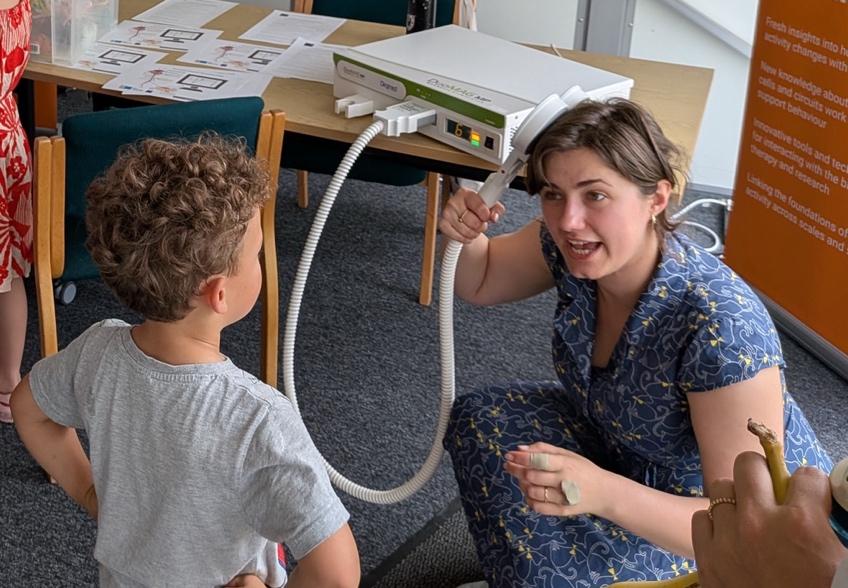
BNDU researcher Ioana Grigoras (right) explains the effects of Transcranial Magnetic Stimulation on the hand movements to a young listener (left).
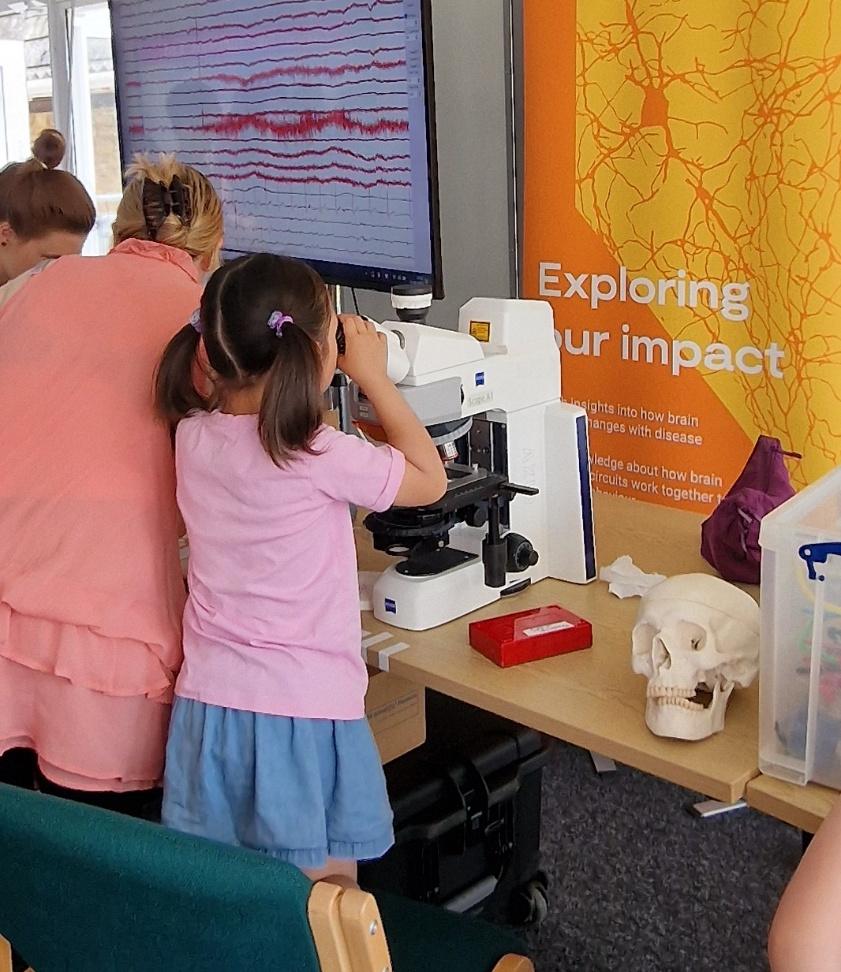
A young attendee observes fluorescent neurons down a light microscope.